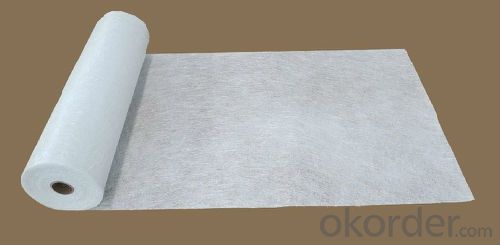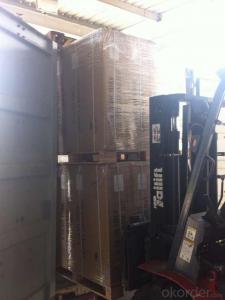Fiber Glass Chopped Strand Mat(E Glass Fiber)
- Loading Port:
- Shanghai
- Payment Terms:
- TT or LC
- Min Order Qty:
- 20000 kg
- Supply Capability:
- 200000Kg Per Month kg/month
OKorder Service Pledge
OKorder Financial Service
You Might Also Like
1.Briet Introductions
Fiberglass Chopped Strand Mat is made of randomly distributed chopped strands held tighter by a emulsion binder. It is compatible with UP, VE, EP resins.
It is compatible with UP, VE, EP, PF resins.
The roll width ranges from 50mm to 3300mm.
Additional demands on wet-out and decomposition time may be available upon request.
It is designed for use in hand lay-up, filament winding, compression molding and continuous laminating processes. Its end-use applications include boats, bath equipment, automotive parts, chemical corrosion resistant pipes, tanks, cooling towers and building components.
2.Product Features
Fast breakdown in styrene
High tensile strength, allowing for use in hand lay-up process to produce large-area parts
Good wet-through and fast wet-out in resins, rapid air lease
Superior acid corrosion resistance
3.Product Specifications
Property | Area Weight | Moisture Content | Size Content | Breakage Strength | Width |
(%) | (%) | (%) | (N) | (mm) | |
Mathods | IS03374 | ISO3344 | ISO1887 | ISO3342 | |
EMC80E | ±7.5 | ≤0.20 | 8-12 | ≥40 | 50-3300 |
EMC100E | ≥40 | ||||
EMC120E | ≥50 | ||||
EMC150E | 4-8 | ≥50 | |||
EMC180E | ≥60 | ||||
EMC200E | ≥60 | ||||
EMC225E | ≥60 | ||||
EMC300E | 3-4 | ≥90 | |||
EMC450E | ≥120 | ||||
EMC600E | ≥150 | ||||
EMC900E | ≥200 |
Special specification can be produce according to customer requirements.

4.FAQ
Packaging:
Each Chopped Strand Mat is wound onto a paper tube which has an inside diameter of 76mm and the mat roll has a diameter of 275mm. The mat roll is wrapped up with plastic film,and then packed in a cardboard box or wrapped up with kraft paper. The rolls can be vertically or horizontally placed. For transportation, the rolls can be loaded into a cantainer directly or on pallets.
Storage:
Unless otherwise specified, Chopped Strand Mat should be stored in a dry, cool and rain-proof area. It is recommended that the room temperature and humidity should be always maintained at 15℃~35℃ and 35%~65% respectively.
- Q:What are the different reinforcement densities available for fiberglass mat tissue?
- The different reinforcement densities available for fiberglass mat tissue can vary depending on the specific manufacturer and product. However, common options include low density (lightweight), medium density, and high density fiberglass mat tissues. These densities are designed to provide different levels of strength, flexibility, and durability for various applications in industries such as construction, automotive, and marine.
- Q:Is fiberglass mat tissue suitable for outdoor applications?
- Indeed, outdoor applications are well-suited for fiberglass mat tissue. This particular material is constructed from interwoven fiberglass strands, all effectively bound together by a specialized adhesive. Its exceptional resistance to water, weather, and UV radiation renders it particularly well-suited for deployment in outdoor settings. Its adaptability extends to a range of outdoor applications, including roofing, insulation, and construction projects. The waterproof and weatherproof qualities of fiberglass mat tissue guarantee its robustness and longevity even in the face of harsh environmental conditions. Moreover, its lightweight nature and user-friendly handling characteristics make it a highly versatile option for various outdoor endeavors.
- Q:What are the typical dimensions and roll sizes of fiberglass mat tissue?
- The typical dimensions and roll sizes of fiberglass mat tissue can vary depending on the specific product and manufacturer. However, in general, fiberglass mat tissue is commonly available in rolls with widths ranging from 1 to 6 feet and lengths ranging from 100 to 1000 feet. The thickness of the tissue can range from 0.5 to 1.5 millimeters. Some manufacturers may offer custom sizes and lengths to suit specific project requirements. It is always recommended to consult the manufacturer or supplier for the exact dimensions and roll sizes of fiberglass mat tissue.
- Q:How does fiberglass mat tissue perform in terms of moisture resistance?
- Fiberglass mat tissue is known for its excellent moisture resistance properties. The material is made up of tightly woven fiberglass strands, which create a barrier against moisture penetration. This makes it highly effective in preventing water or moisture from seeping through and damaging underlying surfaces or structures. Additionally, the resin used to bind the fiberglass strands together also adds an extra layer of protection against moisture, making it even more resistant to water and humidity. Overall, fiberglass mat tissue is a reliable choice when it comes to moisture resistance, making it suitable for various applications where preventing water damage is crucial.
- Q:Is fiberglass mat tissue suitable for marine repairs?
- Yes, fiberglass mat tissue is suitable for marine repairs. It is a versatile material that provides excellent strength and durability, making it ideal for fixing and reinforcing various marine structures and components. Fiberglass mat tissue is known for its resistance to water, chemicals, and corrosion, which is essential in a marine environment. It can be used to repair hulls, decks, bulkheads, and other parts of boats and ships, ensuring structural integrity and preventing further damage. Additionally, fiberglass mat tissue is easy to work with and can be applied using various methods, such as wet lay-up or vacuum bagging, making it a popular choice for marine repairs.
- Q:Is fiberglass mat tissue compatible with different types of resins?
- Yes, fiberglass mat tissue is generally compatible with different types of resins. Fiberglass mat tissue is a versatile material that can be used in conjunction with various types of resins, including polyester, epoxy, and vinyl ester resins. The compatibility between the fiberglass mat tissue and the resin depends on several factors such as the specific type and formulation of the resin, as well as the intended application of the composite material. However, in most cases, fiberglass mat tissue can be used with different types of resins to create strong and durable composite materials. It is important to carefully follow the manufacturer's recommendations and guidelines for resin selection and application to ensure optimal compatibility and performance.
- Q:How does fiberglass mat tissue perform in terms of thermal conductivity?
- Fiberglass mat tissue has low thermal conductivity, meaning it is a poor conductor of heat.
- Q:What are the applications of fiberglass mat tissue?
- Fiberglass mat tissue, a versatile material, is utilized in a multitude of industries. Some notable applications include: 1. Construction and Building Materials: Within the construction industry, fiberglass mat tissue serves as a reinforcement material. It is commonly employed in the production of roofing shingles, insulation materials, and wall coverings. The robust and durable nature of fiberglass mat tissue enhances the structural integrity of buildings and bolsters their resistance to external elements such as wind, moisture, and temperature fluctuations. 2. Automotive Industry: The automotive sector extensively utilizes fiberglass mat tissue for manufacturing components like door panels, headliners, trunk liners, and interior trim parts. Due to its lightweight and high strength properties, fiberglass mat tissue is an ideal material for reducing the overall weight of vehicles while maintaining their structural integrity. 3. Marine Industry: The marine industry relies heavily on fiberglass mat tissue for constructing boat hulls, decks, and other structural components. The corrosion-resistant characteristics of fiberglass mat tissue make it well-suited for marine applications where exposure to water and harsh weather conditions is common. 4. Pipe Manufacturing: Fiberglass mat tissue is employed in the production of fiberglass reinforced pipes. These pipes find applications in various industries, including oil and gas, chemicals, and water management. The high strength and corrosion-resistant properties of fiberglass mat tissue make it an excellent choice for manufacturing pipes capable of withstanding high pressure and harsh chemical environments. 5. Filtration Systems: Fiberglass mat tissue plays a vital role in the production of air filters and liquid filtration systems. The fibrous structure of the material enables efficient filtration by trapping dust particles, dirt, and other contaminants. This makes fiberglass mat tissue the preferred choice for applications requiring high-efficiency filtration, such as HVAC systems, industrial air filters, and water treatment plants. In conclusion, fiberglass mat tissue finds extensive and diverse applications in industries ranging from construction and automotive to marine and filtration systems. Its unique properties make it an invaluable material for enhancing structural integrity, reducing weight, and improving performance across various sectors.
- Q:Can fiberglass mat tissue be used for electrical enclosures?
- No, fiberglass mat tissue is not suitable for electrical enclosures as it does not provide sufficient insulation properties necessary for electrical safety.
- Q:How does the roll weight of fiberglass mat tissue affect its transportation?
- The roll weight of fiberglass mat tissue directly affects its transportation in terms of the ease and cost. Heavier rolls will require more effort and resources for handling, loading, and unloading. They may also require specialized equipment for transportation, leading to higher shipping costs. On the other hand, lighter rolls are easier to handle and transport, reducing the overall logistical challenges and expenses.
1. Manufacturer Overview |
|
|---|---|
| Location | |
| Year Established | |
| Annual Output Value | |
| Main Markets | |
| Company Certifications | |
2. Manufacturer Certificates |
|
|---|---|
| a) Certification Name | |
| Range | |
| Reference | |
| Validity Period | |
3. Manufacturer Capability |
|
|---|---|
| a)Trade Capacity | |
| Nearest Port | |
| Export Percentage | |
| No.of Employees in Trade Department | |
| Language Spoken: | |
| b)Factory Information | |
| Factory Size: | |
| No. of Production Lines | |
| Contract Manufacturing | |
| Product Price Range | |
Send your message to us
Fiber Glass Chopped Strand Mat(E Glass Fiber)
- Loading Port:
- Shanghai
- Payment Terms:
- TT or LC
- Min Order Qty:
- 20000 kg
- Supply Capability:
- 200000Kg Per Month kg/month
OKorder Service Pledge
OKorder Financial Service
Similar products
New products
Hot products
Related keywords




























